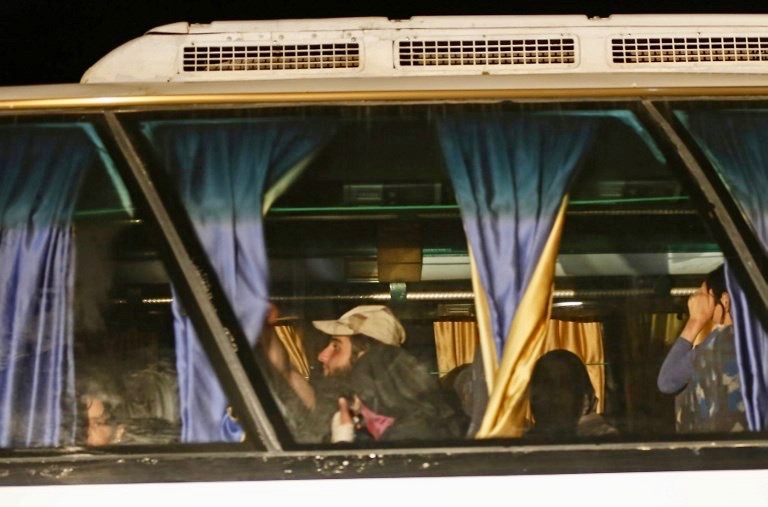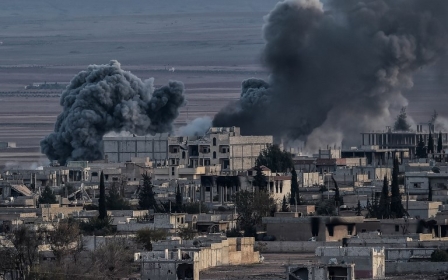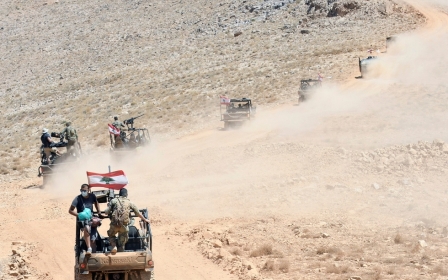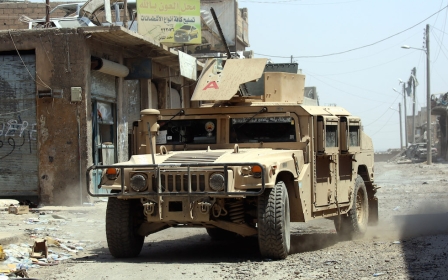Islamic State convoy mostly out of Syrian government area: Hezbollah

Most of an Islamic State (IS) group evacuation convoy stuck in east Syria has crossed out of government territory and is no longer the responsibility of the Syrian government or its ally Hezbollah, the Lebanese Shia group said on Saturday.
A US-led coalition fighting IS has been using warplanes to prevent the convoy from entering territory held by the militants in east Syria. Hezbollah and the Syrian army had escorted it from west Syria as part of a truce deal.
"The Syrian state and Hezbollah have fulfilled their obligations to transfer buses out of the area of Syrian government control without exposing them," the statement said.
Hezbollah said in a statement that the US-led jets were still blocking the convoy of militants and their families, which was stuck in the desert, and were also stopping any aid from reaching it.
Six buses remain in government-held territory under the protection and care of the Syrian state and Hezbollah, the statement said. There were originally 17 buses in the convoy.
Hezbollah said there were old people, casualties and pregnant women in the buses stranded outside Syrian government control in the desert and called on the international community to step in to prevent them coming to harm.
About 300 lightly armed militants were travelling on the buses, having surrendered their enclave straddling Syria's border with Lebanon on Monday under a deal that allowed them to join their militant comrades on the other side of the country.
It angered both the US-led coalition, which does not want more battle-hardened militants in an area where it is operating, and Iraq, which sees them as a threat because the convoy's proposed destination of al-Bukamal is near its own border.
The Syrian government of President Bashar al-Assad, helped by Russia and Iran-backed militias including Hezbollah, is battling IS as it pushes eastwards across the desert.
A commander in the pro-Assad military alliance said earlier on Saturday that Hezbollah and the Syrian army were seeking an alternative way for the convoy to cross into IS territory, having already tried two other routes.
"Work is underway to change the course of the convoy for a second time," the commander said.
Convoy stranded
The coalition has vowed to continue monitoring the convoy and disrupting any effort it makes to cross into militant territory, but said it would not bomb it directly because it contains about 300 civilian family members of the militants.
It has asked Russia to tell the Syrian government that it will not allow the convoy to move farther east towards the Iraqi border, according to a statement issued late on Friday.
On Wednesday, the coalition said its jets had cratered a road and destroyed a bridge to stop the convoy progressing, and had bombed some of the militants' comrades coming the other way to meet it.
Hezbollah and the Syrian army on Thursday changed the route of the convoy from Humeima, a hamlet deep in the southeast desert, to a location further north, but coalition jets again struck near that route, the commander said.
"It was considered a threat, meaning there was no passage that way," the commander said. On Friday, coalition jets made mock air raids over the convoy, the commander added.
"It caused panic among the Daeshis. The militants are scared the convoy will be bombarded as soon as it enters Deir al-Zor," the commander said, using a plural form of the Arabic acronym for IS to refer to its militants.
New MEE newsletter: Jerusalem Dispatch
Sign up to get the latest insights and analysis on Israel-Palestine, alongside Turkey Unpacked and other MEE newsletters
Middle East Eye delivers independent and unrivalled coverage and analysis of the Middle East, North Africa and beyond. To learn more about republishing this content and the associated fees, please fill out this form. More about MEE can be found here.




